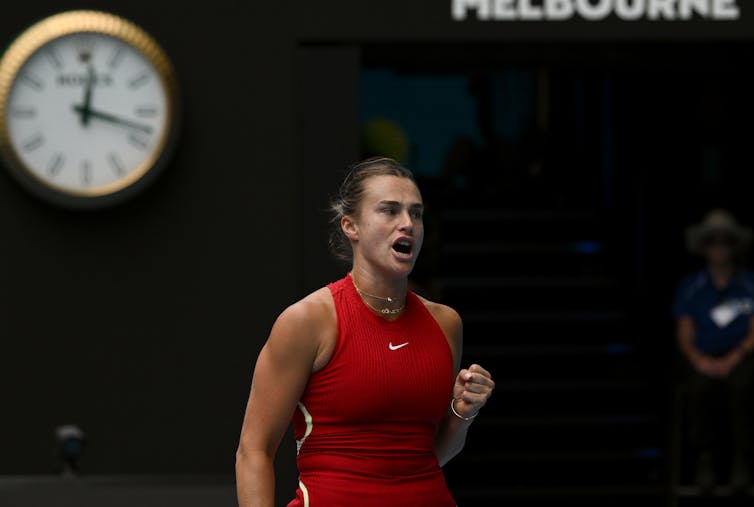For many Australians, January is synonymous with late nights spent watching the Australian Open tennis tournament. These night matches are a great spectacle, and many players consider the prime time slot on centre court as a privilege and reward for their hard work.
An early highlight of this year’s tournament was the men’s third seed Daniil Medvedev playing out a five-set thriller against unseeded Emil Ruusuvuori, with the match finishing at nearly 4am. Less than 48 hours later, Medvedev followed this up by winning his next round match.
In Medvedev’s post-match interview, he discussed recovery and preparation strategies after the previous late-night finish. This included ice baths, medical treatment and physio work before finally going to bed at around 7am, managing to get five hours of sleep.
Similarly, the first round match for women’s number two seed, Aryna Sabalenka, didn’t start until almost midnight.
As sleep scientists, we know limited and disrupted sleep opportunities can impact the body. So what do these late nights and lack of sleep mean for players’ recovery and performance?
Why a lack of sleep is bad for your muscles
The function of sleep is still not well understood, despite us spending close to a third of our life asleep. While we do know that sleeping less than six hours a night is linked to the increased risk of several chronic diseases, there is still much to investigate.
Several recent studies we’ve worked on have demonstrated the importance of sleep for optimal muscle function. For example, one night of sleep deprivation (pulling an “all-nighter”) or repeated nights of short sleep actually impair the muscles’ ability to make new proteins, which is essential for repair and recovery.
Furthermore, other recent research suggests that a period of sleep loss (five nights, with four hours of sleep each night) can reduce mitochondrial function within your muscles. Mitochondria are known as the “powerhouses of the cell” and are responsible for producing the energy needed to exercise – and win a tennis match.
Therefore, the lack of sleep tennis players experience after such late-night finishes may well impact their recovery and subsequent performance.

Sleep loss directly affects athletic performance
It is well accepted that sleep loss negatively impacts cognitive function and decision making. While the data is not definitive, there are also several studies that show sleep loss impacts athletic performance.
A recent study in healthy young women accustomed to resistance exercise found that when they performed their weights session after several nights of restricted sleep, the quality and volume of their performance was reduced. The effort it took to complete the session increased, too.
Losing sleep is also detrimental to anaerobic power and skill execution – both of which are critical for Australian Open hopefuls. One study found a decline in tennis serving accuracy with only five hours of sleep, while another found a decline in maximal power output.
Exercise can help you sleep – but it depends
It is a widely held belief that exercise improves sleep. However, falling asleep shortly after completing an adrenaline-fuelled, high-intensity tennis match is not always easy.
Indeed, a recent study investigated the impact of high-intensity exercise on sleep quality. When the high-intensity exercise was performed in the early afternoon, deep sleep was improved. But when participants exercised shortly before bed, their sleep quality diminished.
However, this effect also depended on whether the person was a morning lark or evening owl (scientists call this a chronotype). The sleep quality of evening types was unaffected by exercise in the evening.
When it comes to tennis stars, a late-night finish can also affect their circadian rhythm. By the time Medvedev or Sabalenka would have got to bed, their natural, tightly regulated internal clock would have been readying them to wake up. Such a misalignment between the body’s circadian rhythm and the body’s drive for sleep tend to result in disrupted, insufficient sleep.

Read more: Jetlag hits differently depending on your travel direction. Here are 6 tips to get over it
Can players prepare to handle late-night matches?
Some players have voiced their concerns regarding late-night matches. But other players suggest it’s just part of the game. So what can a player do to prepare for the sleep disruption?
Professional athletes have a number of strategies available. For example, napping has myriad benefits for both cognitive function and physical performance.
A popular supplement, caffeine, has consistently been shown to improve physical performance and alertness. While endurance exercise has shown the largest performance benefits from caffeine, small to moderate improvements have been shown in muscle strength, sprinting, jumping and throwing performance.
However, caffeine can be detrimental to subsequent sleep. While athletes preparing for late matches might have an evening caffeine hit, the average Australian should avoid drinking coffee after 3pm.
Increasing sleep duration in the week leading up to late-night matches can also help. Studies have shown that sleep extension increases tennis serving and basketball free throw accuracy almost 10%. Increasing sleep duration could really be the difference between hitting a winner or an unforced error.
It remains to be seen if athletes like Medvedev and Sabalenka will overcome their disrupted sleep and prevail at this year’s Australian Open. But there’s certainly an advantage to having a good night’s shut eye.

